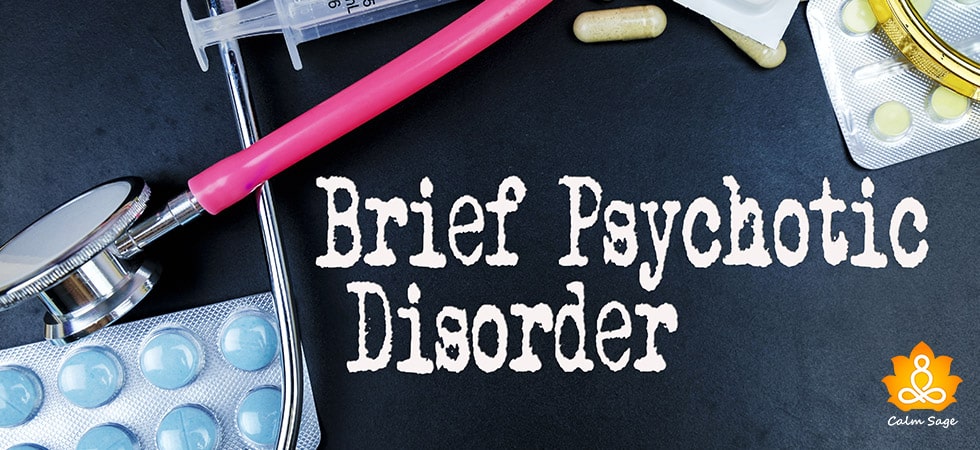All You Need To Know About Brief Psychotic Disorder

The content in this article is thoroughly researched and written based on the extensive testing and reviewing by a reviews team and does not reflect the viewpoints of the Calm Sage editorial team. Calm Sage could receive a commission from product purchased mentioned or featured in this article.
Brief psychotic disorder is a mental health condition that can be identified by temporary and sudden periods of psychotic episodes or behaviors such as confusion, hallucinations, or delusions.
Yes, the symptoms of brief psychotic disorder look similar to the symptoms of schizophrenia but psychologically, there’s a difference between the two! Brief psychotic disorder can turn into intense or chronic episodes of psychosis if not diagnosed or treated before time.
In this blog, let us read about everything we need to know about a brief psychotic disorder. So, let’s get started!
List of Contents
- What is Brief Psychotic Disorder?
- Types of Brief Psychotic Disorder
- Symptoms of Brief Psychotic Disorder
- Causes of Brief Psychotic Disorder
- Risk Factors Associated with Brief Psychotic Disorder
- Diagnosis and Treatment of Brief Psychotic Disorder
- Below are some of the effective treatment options for brief psychotic disorder:
- Key Takeaway: Quick Self-Help Tips for Brief Psychotic Disorder
What is Brief Psychotic Disorder?
According to psychology, a brief psychotic disorder is a thought disorder that is characterized by the abnormal or abrupt presence of psychosis. People struggling through episodes of brief psychotic disorder generally experience more than two symptoms and an individual must be experiencing symptoms for more than one month.
Brief psychotic disorder is more commonly found in young adults or teenagers. The symptoms of brief psychotic disorder are more severe and they can also cause suicidal thoughts, violent behavior, and more.
The main difference between other psychotic disorders and brief psychotic disorder is that it is not triggered by alcohol or drug abuse.
Types of Brief Psychotic Disorder
Generally, there are three types of brief psychotic disorder:
1. Brief Psychotic Disorder without Noted Stressors
This type of BPD is observed when there’s no influence from a stressor or stressful event that would hinder someone’s ability to cope with the triggers.
2. Brief Psychotic Disorder Postpartum Type
This type of brief psychotic disorder is observed when a female is pregnant or recently delivered a child (mostly four weeks after delivery).
3. Brief Reactive Psychosis
This type of brief psychotic disorder is observed when a psychotic episode is triggered by a series of stressors. This type of BPD can hinder someone’s ability to cope with the symptoms.
Symptoms of Brief Psychotic Disorder
Symptoms of brief psychotic disorder generally last for 24 hours to less than a month. An individual struggling through the symptoms of a brief psychotic disorder might return to typical functioning after the episode is over, generally in response to therapy or medications. Below are some of the common symptoms of brief psychotic disorder:
- Catatonic behavior or grossly disorganized (limited body movement, no speech or interaction, no engagement with the surroundings)
- Changes in eating, sleeping, and behavior
- Delusions (constant false beliefs)
- Disorganized behavior
- Disorganized speech (inconsistent or odd speech patterns)
- Disorganized thought process
- Extreme and sudden mood changes
- Hallucinations (seeing or hearing that are not real)
- Indecisiveness
- Lethargy
- Memory problems
Causes of Brief Psychotic Disorder
The exact cause of brief psychotic disorder is quite unclear but research shows that the major focus is on stress or trauma. Research also shows that brief psychotic disorder in older adults is mostly developed due to genetics, neurological conditions, environmental conditions, and more. A brief psychotic disorder can be developed due to the following reasons:
- Childbirth
- Genetics
- History of personality disorder or mood disorder
- Major trauma or series of stressful events
Research also shows that brief psychotic disorder is caused or triggered by extreme stress such as sudden loss of loved ones, traumatic incidents, and others.
Generally, the symptoms are followed back to the previous functioning levels which is why, most clients are not aware of negative or strange behaviours.
Research also shows that people struggling with co-occurring conditions such as personality disorders are at a high risk of developing brief reactive psychosis.
Risk Factors Associated with Brief Psychotic Disorder
Below listed are some of the risk factors that make people prone to developing brief psychotic disorder:
- Childbirth or pregnancy
- Co-occurring conditions such as mood disorders or personality disorders
- Environmental disaster
- Female
- High-level stress or trauma
- Immigration
- Refugee or immigrant
- Sudden death of a loved one
- War
Diagnosis and Treatment of Brief Psychotic Disorder
If you think you or your loved one might be experiencing the symptoms of a brief psychotic disorder, you must consider connecting with a physician or mental health professional to get a proper diagnosis.
In order to get a proper diagnosis, an individual must meet the criteria:
- Symptoms must not last for over a month
- Symptoms must be explained with physical health issues such as substance use or withdrawal
- Individuals must experience more than one symptom with a high level of risk
According to the research, the diagnosis is generally based on factors such as:
- Intensity and duration of symptoms
- Socioeconomic stability
- Suicidal thoughts or behavior
To connect with a mental health professional through online platforms, click below:

Great for a large network of licensed therapists
-
$60 to $90/week, billed every 4 weeks
-
Therapy via messaging, phone, or live video chat
-
Flexible cancellation at any time
20% off your first month

Great for CBT Based therapists
-
$40/week, billed every 4 weeks
-
Therapy via messaging, phone, or live video chat
-
Specialization for CBT based Therapy
20% off your first month

Best for Treatment Plants
-
$60 to $90/week, billed every 4 weeks
-
Therapy via messaging, phone, or live video chat
-
Flexible cancellation at any time
$100 off your first month with code SPACE
Additionally, the following disorders must be ruled out while making a diagnosis:
- Bipolar disorder with psychosis
- Major depressive disorder with psychosis
- Schizophrenia
- Schizoaffective disorder
Below are some of the effective treatment options for brief psychotic disorder:
The goal of psychotherapy is to help clients identify and manage the situations caused or triggered by the disorder.
1. Cognitive Behavioral Therapy (CBT):
CBT helps in replacing negative thoughts patterns with positive ones. The therapist works on changing negative patterns, habits, or thought processes with the help of different exercises, symptom logs, and journals.
2. Family and Group Therapy:
Family and group therapy might also include couples during group sessions. The main objective of such therapies is to promote effective communication so that the client can openly share their concerns or symptoms. If in case, the symptoms are triggered by family dynamics, different techniques and approaches are used to address the situation accordingly.
3. Acceptance and Commitment Therapy (ACT):
ACT uses evidence-based mindfulness and acceptance strategies which helps in building healthy or positive patterns and helps in enhancing focus.
Key Takeaway: Quick Self-Help Tips for Brief Psychotic Disorder
Below are some of the quick and effective self-help tips for overcoming brief psychotic disorder along with therapy:
- Practice mindfulness
- Practice self-compassion and empathy
- Listen to others actively
- Remain calm and learn to express your feelings
- Surround yourself with people who support you
- Validate your emotions and feelings
I hope this blog helps you understand everything you wanted to know about a brief psychotic disorder.
Comment down and share your queries on a brief psychotic disorder. For more such content, connect with us through all social media platforms.
Thanks for reading!




















